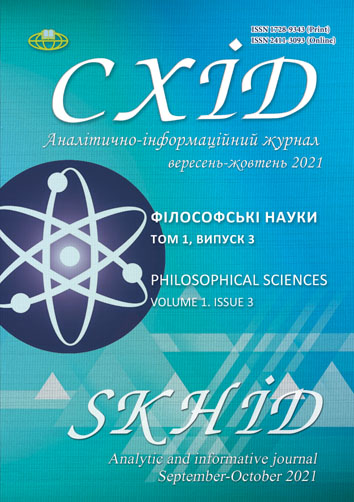THE RELIGIOUS FACTORS OF THE UKRAINIAN MENTALITY FORMATION
DOI:
https://doi.org/10.21847/1728-9343.2021.1(3).242755Keywords:
mentality, mindset, Ukrainian mentality, national identity, religious archetypes, religious symbols, religious and cultural tradition, sacred model of the worldAbstract
In the modern global world, a study on mentality as a main characteristic of the nation which defines the unity of the religious and cultural tradition of the society is conditioned with the need to develop an effective international religious and cultural cooperation. The purpose of the analysis is to determine religious factors in shaping the Ukrainian mentality taking into account its historical background and the challenges of modernity. The study methodology is based on the principles of the non-confessional approach and philosophical pluralism, involving a system of methods, namely: historical, dialectical, comparative methods, synthesis, and generalization.
In the conclusions it is emphasized that mentality is one of the forms of the social experience accumulation, the set of historically accepted ideas, viewpoints, stereotypes, forms and behavior which are laid down is the public consciousness by means of education, culture, religion, a language through the years. Every mental formation has its imaginary lines of a friend and foe which were formed by ideologies, beliefs, and religious values. The religious factors in the formation of mentality reflect the role of the Church as the main regulator of the social life. In the social environment of the Ukrainian nation, a temple can be seen as a peculiar archetypical formation, the part of the landmark, symbolic, communicative, and informational religious system which regulates the public consciousness and it is an integral part of the national memory.
The mental archetypes of the national identity stem from the phenomenon of the borderlands, and have shaped in the social context the desire for personal freedom, patriotism, social activity; in the spiritual dimension, it is a willing for the inner world to be protected, sacrifice, mercy, non-violence.
Downloads
References
Baltadzhy, P., Matvieieva, L. (2019). The Category of "Mentality" in Contemporary Scientific Discourse. Fundamental and applied researches in practice of leading scientific schools, 34(4), 75–78 https://farplss.org/index.php/journal/article/view/654
Dubov, I. G. (1995) The Phenomenon of Mentality. Journal of Russian & East European Psychology, 33 (2), 39-54
Kuznetsova, E. (2017). The Mentality of the People: Theoretical and Methodological Aspect, London Journal of Research in Humanities and Social Sciences, 17, 2, 6 – 11. https://journalspress.com/LJRHSS_Volume17/147_The-Mentality-of-the-People-Theoretical-and-Methodological-Aspect.pdf
Lomachinska, I. Grebenyuk, P. (2020). The phenomenon of missionary activity of Christian churches in the virtual space, Skhid, 5 (169), 54 – 59. https://doi.org/10/21847/1728-9343.202.5(169)215022
Lomachinska, I., Khrypko, S., Iatsenko, G. (2019). The ideological sources of religious leadership in Ukrainian cultural space, Skhid, 3 (161), 84 – 88 https://doi.org/10.21847/1728-9343.2019.3(161).171725
Tulenkov, M., Gugnin, E., Shtepa, S., Patynok, O., Lipin, M. (2021). Mentality as Category of Social Philosophy in the Post-Pandemic Society. Postmodern Openings, 12, 393 – 403 https://doi.org/10.18662/po/12.1Sup1/292
Vasilyeva, K., Ochirov, O. (2017) The Mentality as the Image of the Cognitive Properties of the Other, Advances in Social Science, Education and Humanities Research, 124, 39 – 42 https://www.researchgate.net/publication/329105375_The_Mentality_as_the_Image_of_the_Cognitive_Properties_of_the_Another
Antropolohichnyi kod ukrainskoi kultury i tsyvilizatsii (2020). Kyiv: IPiEND im. I. F. Kurasa NAN Ukrainy, Knyha. 1. 432 р. (In Ukrainian)
Blok M. (1973) Apologiya istorii ili remeslo istorika. Moscow: Nauka, 234 р. (In Russian)
Vundt V.(2002) Psikhologiya narodov. Moscow: Izd-vo Eksmo; Sankt- Peterburg: Terra Fantastica. 864 р. (In Russian)
Gurevich A. Ya. (1993) Ot istorii mentalnostey k istoricheskomu sintezu. In: Spory o glavnom. Diskussii o nastoyashchem i budushchem istoricheskoy nauki vokrug frantsuzskoy shkoly «Annalov». Moscow: Nauka. 328 р. (In Russian)
Dodonov, R. (1999) Teoriya mentalnosti: uchenie o determinantakh myslitelnykh avtomatizmov. Zaporozhe: r/a "Tandem-U". 264 р. (In Russian)
Kalakura, Ya. S. (2015). Ukrainska kultura: tsyvilizatsiinyi vymir. Kyiv: IPiEND im. I. F. Kurasa NAN Ukrainy, 2015. 496 р. (In Ukrainian)
Kolinko, M. V. (2017). Rozvidky kulturnoho porubizhzhia: border, boundary, frontier studies. Skhid. 2 (148), 91–95. https://doi.org/10.21847/1728-9343.2017.2(148).102808
Kostomarov, M. I. (1994). Slovianska mifolohiia. Kyiv: Lybid. 384 р. (In Ukrainian)
Krymskyi, S. B. (2006) Arkhetypy ukrainskoi mentalnosti. In: Problemy teorii mentalnosti. Kyiv: Naukova dumka, 2006. 408 c. (In Ukrainian)
Le Goff, Zh. Tsivilizatsiya srednevekovogo Zapada. Moskva: Progress-akademiya, 1992. 376 р. (In Russian)
Lebon, G. (1998) Psikhologiya mass. In: Psikhologiya mass. Khrestomatiya. Samara: Izdatelskiy Dom “BAKhRAKh”. 592 р. (In Russian)
Lomachіnska, I.M. (2019). Vplyv relihiinoho liderstva na formuvannia tsinnisnykh zasad natsionalnoi pamiati. In: Trudne pytania pamięci historycznej w paradygmacie dialogu kulturowego. Białystok: Białoruskie Towarzystwo Historyczne, р.188 – 203 (In Ukrainian)
Popovych, M. (2006). Ukrainska natsionalna mentalnist. In: Problemy teorii mentalnosti. Kyiv: Naukova dumka. рр.232 – 270 (In Ukrainian)
Fevr, L. (1991). Boi za istoriyu. Moscow: Nauka, 635 р. (In Russian)
Fromm, E. (2019). Vtecha vid svobody. Kyiv: «Klub Simeinoho Dozvillia». 288 c. (In Ukrainian)
Chyzhevskyi, D. (2005). Filosofski tvory: u 4 t. Kyiv: Smoloskyp. T. 1: Narysy z istorii filosofii na Ukraini. Filosofiia Hryhoriia Skovorody.400 р. (In Ukrainian)
Yung, K.-G.(2020). Arkhetipy i kollektivnoe bessoznatelnoe. Moscow: «Izdatelstvo AST», 496 р. (In Russian)
Downloads
Published
How to Cite
Issue
Section
License
Copyright (c) 2021 Irina Lomachinska, Evgeniy Deinega, Oleksandr Donets

This work is licensed under a Creative Commons Attribution-NonCommercial-NoDerivatives 4.0 International License.
1. Authors bear responsibility for the accuracy of facts, quotations, numbers and names used.
2. Manuscripts are not sent back.
3. The publisher does not always agree with the authors' opinion.
4. The authors reserve the right to authorship of the work and pass the first publication right of this work to the journal under the terms of a Creative Commons Attribution-NonCommercial-NoDerivatives 4.0 International License. This license allows others to distribute (copy) the published work for non-commercial purposes, provided there is mandatory attribution to its authors and a link to the first publication in our journal.
5. The authors have the right to conclude separate supplement agreements that relate to non-exclusive work distribution in the form in which it has been published by the journal (for example, to upload the work to the online storage of the journal or publish it as part of a monograph), provided that the reference to the first publication of the work in this journal is included.

